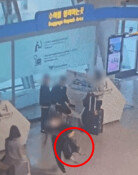Popularity of Japan's sumo continues, compares with Korean ssireum
Popularity of Japan's sumo continues, compares with Korean ssireum
Posted September. 18, 2016 08:03,
Updated September. 18, 2016 08:18
Japan's sumo is similar to ssireum, Korean wrestling, in some sense, but its popularity is far beyond the Korean rival. In Japan, sumo's popularity is similar to that of a pro baseball. In Korea, sumo is often regarded as players who have simply enlarged their body by gaining weight and boasting of their physical strength. However, in Japan, sumo is highly respected as it is regarded as a national sports and a culture that contains the soul of its people.
As sumo's popularity fell, various efforts have been made in Japan that went beyond traditions. According to Japanese Embassy in Korea, foreign players, including those in Mongolia, China and Argentina, were earnestly brought in into the sumo arena after the 1960s. By the 1990s, foreign sumo players started to grab top positions. Since 2003, Mogolian player Hakuho Sho has recorded 63 straight wins, raising concerns that foreign players are dominating the yokozuna, sumo tournament No. 1 place.
Sumo has also been mired in a crisis amid disputes on gambling and manipulation of game results, but remains relatively unshaken.
Ticket prices for sumo are expensive at about 10,000 yen (97.75 dollars), but the tickets for the 10,000 seat National Institute for Fitness and Sport in Tokyo are often sold out. People can buy tickets that include taking photos with the sumo player and having dinner or lunch together with them. Asahi Shimbun recently reported the phenomenon of young female fans, dressed in kimonos, flocking into sumo stadiums.
Sumo will never win ssireum when it comes to fancy techniques. However, Nihon Sumo Kyokai is trying to attract more spectators by putting forward various events such as one where children can compete with a pro player, in order to improve image in a friendly way. Since sumo is a sports that is based on Japan's traditional religious events, the games carry such traditional colors thus attracting foreign tourists as well.
In Korea, there are calls that ssireum should learn from sumo that has overcome its recession. Heo Kun-sik, senior researcher at the 2016 CheongJu World Martial Arts Masterships, said, "Japan raised morale of sumo players through various sponsorships for pro sumo, while for amateur sumo it promoted its globalization by setting up associations in more than 100 countries." Lee Tae-hyun, professor at Yong-in University, said it all comes down to marketing, adding, "Efforts should be made to market the games and not just adhere to techniques."
홍정수기자 hong@donga.com







